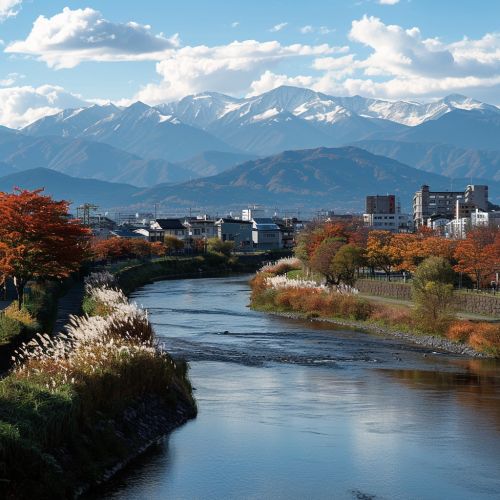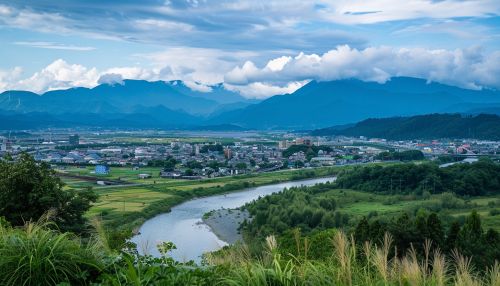Chitose, Hokkaido
Geography and Climate
Chitose is a city located in the Ishikari Subprefecture of Hokkaido, Japan. It is situated approximately 40 kilometers southeast of Sapporo, the capital of Hokkaido. Chitose is known for its strategic location as it hosts the New Chitose Airport, the primary gateway to Hokkaido. The city covers an area of 594.95 square kilometers and is characterized by a diverse landscape that includes mountains, rivers, and plains.
The climate of Chitose is classified as humid continental, with cold winters and warm summers. The average annual temperature is around 8°C, with January being the coldest month, averaging -6°C, and August being the warmest, averaging 22°C. The city receives significant snowfall during the winter months, making it a popular destination for winter sports enthusiasts.


History
The history of Chitose dates back to the Jomon period, with archaeological evidence indicating early human settlement in the region. During the Edo period, the area was part of the Matsumae Domain, which controlled much of Hokkaido. The modern city of Chitose was established on July 1, 1958, following the merger of several smaller towns and villages.
Chitose played a significant role during World War II as it was home to a major Japanese airbase. After the war, the airbase was taken over by the United States Air Force and later returned to Japan. Today, the site is part of the New Chitose Airport, which opened in 1988 and has since become one of the busiest airports in Japan.
Economy
Chitose's economy is diverse, with key industries including aviation, manufacturing, agriculture, and tourism. The presence of New Chitose Airport has spurred the growth of the aviation industry, with numerous airlines and related businesses operating in the city. The airport also serves as a hub for cargo transportation, facilitating the export of local products.
The manufacturing sector in Chitose is robust, with companies producing a wide range of goods, including electronics, machinery, and food products. The city is home to several industrial parks that attract both domestic and international businesses.
Agriculture remains an important part of Chitose's economy, with the fertile plains surrounding the city being ideal for farming. Key agricultural products include rice, potatoes, and various vegetables. Dairy farming is also prevalent, contributing to the production of milk and other dairy products.
Tourism is another vital industry, with Chitose attracting visitors year-round. The city's natural beauty, combined with its proximity to Sapporo and other popular destinations in Hokkaido, makes it a favored spot for tourists. Winter sports, hot springs, and scenic landscapes are among the main attractions.
Transportation
Chitose is a major transportation hub in Hokkaido, primarily due to the presence of New Chitose Airport. The airport offers both domestic and international flights, connecting Hokkaido to major cities in Japan and around the world. It is equipped with modern facilities, including shopping centers, restaurants, and hotels, making it a convenient gateway for travelers.
The city is also well-connected by rail, with the JR Chitose Line providing access to Sapporo and other parts of Hokkaido. The Chitose-Eniwa Interchange on the Hokkaido Expressway facilitates road transportation, linking Chitose to the broader highway network.
Public transportation within the city includes buses operated by Chuo Bus and Hokuto Kotsu, providing convenient access to various parts of Chitose and neighboring areas.
Education
Chitose boasts a well-developed education system, with numerous public and private schools serving the city's residents. The city is home to several elementary, junior high, and high schools, providing comprehensive education from primary to secondary levels.
Higher education institutions in Chitose include the Chitose Institute of Science and Technology, which offers undergraduate and graduate programs in various fields, including engineering, biotechnology, and environmental science. The institute is known for its research contributions and collaboration with industries, fostering innovation and technological advancement.
Culture and Attractions
Chitose has a rich cultural heritage, with various festivals and events held throughout the year. The Chitose-Lake Shikotsu Ice Festival is one of the most popular events, attracting visitors with its stunning ice sculptures and winter activities. The festival is held annually at Lake Shikotsu, a caldera lake located within Shikotsu-Toya National Park, known for its crystal-clear waters and beautiful scenery.
The city is also home to several museums and cultural facilities, including the Chitose Salmon Aquarium, which showcases the life cycle of salmon and other aquatic species native to the region. The Aoba Park, located in the heart of Chitose, offers recreational facilities, walking trails, and a botanical garden, making it a popular spot for both residents and visitors.
Natural Environment
Chitose is blessed with abundant natural beauty, with numerous parks, lakes, and mountains offering opportunities for outdoor activities. Lake Shikotsu, one of the most prominent natural attractions, is renowned for its pristine waters and scenic surroundings. The lake is a popular destination for boating, fishing, and hiking, with several trails providing access to the surrounding mountains.
The Chitose River, which flows through the city, is another significant natural feature. The river is known for its clear waters and is a popular spot for fishing, particularly for salmon. The riverbanks are lined with parks and walking paths, providing a serene environment for relaxation and recreation.
The city's proximity to Shikotsu-Toya National Park offers additional opportunities for nature exploration. The park is home to diverse flora and fauna, volcanic landscapes, and hot springs, making it a haven for nature enthusiasts and adventure seekers.
Demographics
As of the latest census, Chitose has a population of approximately 97,000 residents. The city has experienced steady population growth over the years, driven by its economic development and strategic location. The population is relatively young, with a significant proportion of residents being under the age of 40.
Chitose is known for its high quality of life, with well-developed infrastructure, healthcare facilities, and educational institutions. The city has a strong sense of community, with various local organizations and events fostering social cohesion and cultural exchange.
Government and Administration
Chitose is governed by a mayor-council system, with the mayor being the chief executive officer of the city. The city council is responsible for legislative functions, including the formulation of policies and budget approval. The local government is committed to promoting sustainable development, economic growth, and the well-being of its residents.
The city administration is divided into several departments, each responsible for specific functions such as public works, education, health, and welfare. The local government works closely with community organizations, businesses, and residents to address various issues and enhance the quality of life in Chitose.
